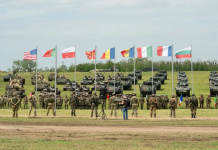By Donald Stoker
Before tackling this question, we must set the analytical stage by understanding the parameters for US action: the political aims and grand strategy of the Joseph Biden administration. Secretary of State Anthony Blinken made clear in May 7, 2021 remarks to the United Nations Security Council that the US political aim is maintaining the “rules-based international order.” This is the international system of diplomatic and economic organizations, norms, and responsibilities under which nations have interacted since the Second World War but particularly since the end of the Cold War. Additionally, Biden’s Indo-Pacific Strategy says the administration seeks a free and open Pacific and specifically calls-out China as a threat, saying: “The PRC’s [People’s Republic of China’s] coercion and aggression spans the globe, but it is most acute in the Indo-Pacific.”
It is important to remember that deterrence is not a political aim but a grand strategy. Combining usage of facets of national power can produce a grand strategy of deterrence. Success here can enable the achievement of the administration’s aim of preserving the “rules-based international order.” Secretary of Defense Lloyd Austin tells us in the new National Defense Strategy that China is a “pacing threat” and that America’s strategy—really grand strategy—is “integrated deterrence,” described as “using every tool at the Department’s disposal, in close collaboration with our counterparts across the U.S. Government and with Allies and partners, to ensure that potential foes understand the folly of aggression.”
But can “integrated deterrence” prevent China from invading Taiwan? We tackle this by examining two significant US interactions with the Chinese Communist regime: the Korean War and the Vietnam War.
Korea, a Japanese possession, was divided into the Communist North and non-Communist South in 1945 at the end of the Second World War. Mao Tse-Tung’s Communist China won its civil war in 1949 and built a close relationship with North Korea’s Communist government. Its leader, Kim Il-Sung, grandfather of North Korea’s current ruler, had fought alongside the Chinese Communists against the Japanese in Manchuria. Mao supported the new regime and helped build its army, even dispatching two divisions of Koreans who had fought under Mao.
In 1950, Kim launched his war against the unprepared South and the US and UN intervened. Mao originally intended to stay out of the Korean War, which the North waged to conquer the South. But on September 9, 1950, before U.S. forces landed at Inchon on September 15, the Harry S. Truman administration changed its political aim from securing South Korea and sought to unify the peninsula. The US and United Nations forces moved northward. China joined the war, initially committed 260,000 troops, seeking to unify the peninsula under North Korean rule. The war cost China more than Mao ever imagined—including one of his sons— and he failed to achieve his aim, but he kept the US and its capitalist running-dog client off China’s border. America’s immense economic and military superiority hadn’t deterred China from going to war against the US, nor did America’s possession of atomic weapons—which China didn’t have.
During the Vietnam War (the years of heaviest US involvement ran from 1961-1973), China wasn’t deterred from supporting North Vietnam. China’s relationship with the North Vietnamese Communist regime had deepened during Vietnam’s war for independence launched in 1946. Chinese sanctuary, support, and advisors helped the Vietnamese Communists create the army that triumphed over the French at Den Bien Phu. The 1954 Geneva Accords partitioned Vietnam into northern Communist and southern non-Communist states. China’s continuing support for North Vietnam extended to committing 320,000 troops from 1965-1968, peaking at 170,000 in 1967. They crewed air defense weapons, helped build and maintain the Ho Chi Minh trail, and permitted the North to send more of its own people to fight it war of conquest against South Vietnam. This relationship soured in 1969 because, among other things, China disagreed with North Vietnam’s Tet Offensive. The last Chinese troops left in 1973.
So, why was China not deterred from involvement in the Korean and Vietnam Wars? There are four key factors to consider.
First, in both Korea and Vietnam, the Chinese saw threats to their own security from a foreign power—the United States—and in both examples had political aims the achievement of which demanded their involvement, though in different ways.
Secondly, China possessed the will to intervene. It was willing to fight in both places, endure the risks of escalation, and pay enormous costs in blood and treasure. At least 180,000 Chinese died in the Korean War. Many estimates are much higher. About 1,100 died defending North Vietnam. Financial and equipment costs ran to the billions of dollars.
Thirdly, in both Korea and Vietnam China possessed the capability to intervene. China bordered both and could move forces into each nation overland without assistance from another power or unbearable enemy interference.
Finally, and most importantly, Korea and Vietnam were geographic areas China considered vital to its security. Mao wouldn’t countenance US forces on its North Korean border with Manchuria, China’s most industrialized and resource rich area. Though the Chinese and Vietnamese disliked one another for historical reasons, Mao refused to tolerate a US invasion of North Vietnam—which borders China—and told Hanoi Beijing would fight if this occurred.
China became involved because of a perceived threat to the nation’s security from a foreign power, possessed the capability and willingness, and strategic geography.
This returns us to our question: Can China be deterred from invading Taiwan?
An important thing to consider here is what Prussian military theorist Carl von Clausewitz calls the value of the object—meaning the value placed upon the political aim or aims sought. The object here is Taiwan. How badly does China want it?
Consider the value of an independent North Korea and North Vietnam in Beijing’s eyes in comparison to the value of regaining the “lost province” of Taiwan. Beijing was willing to fight for both of these even though neither are parts of what it considers China. The value of the object—Taiwan—is exceedingly high in Beijing’s eyes. It is key strategic geography. Perhaps only regime survival ranks higher.
But does the regime have the willingness? Many argue not, insisting the financial and economic costs would be so devastating that China wouldn’t dare. The example given is Russia. It invaded Ukraine and is a pariah in the eyes of most Western and industrialized states. But how much does this matter?
Historically, politics and political aims trump economic concerns. For example, Britain’s largest trading partner before World War I was Germany. London didn’t hesitate to go to war when Germany threatened British political interests by invading Belgium, thus gaining control of some key channel ports. Stalin poured natural resources into Nazi Germany, including oil Germany desperately needed, up to the moment the Germans invaded in 1941. Losing this didn’t deter Hitler. In February 2022, Russia escalated its war against Ukraine, sacrificing its economic relations with most of the world in pursuit of a political aim (conquest of Ukraine) that Vladimir Putin deemed necessary.
Additionally, it’s important to remember that Communist China has never shirked from using military force against its neighbors, whether against India in 1962, the Soviets in 1969, or North Vietnam in 1979. This is also a regime that has murdered perhaps 60 million of its own people and is currently conducting a genocide against it Uigur minority. It isn’t constrained by public opinion at home or abroad. Beijing has the will to fight a war for Taiwan when China’s leaders deem it time, and will pay the costs in lives and economic well-being. Totalitarian regimes are historically quite willing to sacrifice their citizens for political and ideological aims.
But does China possess the capabilities? This is more difficult to answer. We know China is doing its utmost to develop the forces for conquering Taiwan. Today, one usually doesn’t invest heavily in a marine corps and amphibious capability unless one is considering its future utility. But China has also developed a nuclear triad, extensive cyber and space capabilities, and powerful naval, air, and rocket forces. These contribute to its own strategy of deterrence directed at Washington and Beijing’s efforts to intimidate states into inaction or compliance. Moreover, China’s civilian merchant marine and shipping companies serve the Chinese government.
But again, does China have the capabilities? This is difficult to answer decisively. But the danger point occurs when China believes it has the capability. This would align with the first of our four items mentioned above: removing a perceived national security threat, this one being a potentially independent Taiwan aligned to powers such as the United States.
All of this answers our question: It is exceedingly difficult to deter China in regard to Taiwan. Beijing will act against it when it believes it is ready.
Remember, a key Biden administration’s political aim is the maintenance of the liberal international order, the geopolitical status quo. A part of doing this is keeping Taiwan free. The free nations—particularly the US—must have sufficient military means and alliance strength to produce overwhelming doubt in the minds of China’s leaders—especially Xi Xinping—regarding whether or not China can secure its political aim at an acceptable cost.
Successful implementation of a deterrence strategy requires strength, capability, credibility, and will. This is, of course, the rub.
Donald Stoker is Professor of National Security and Resource Strategy at the National Defense University’s Dwight D. Eisenhower School and author of the forthcoming Purpose and Power: US Grand Strategy from the Revolutionary Era to the Present (Cambridge University Press). The views expressed here are his own.
Source: realcleardefense.com





